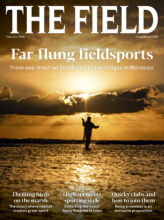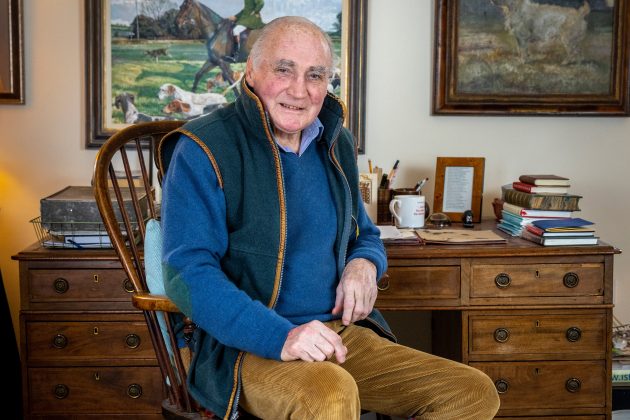Rory Knight Bruce talks to celebrated huntsman and Master Captain Ian Farquhar who led hounds across country and over legal obstacles for 44 years.
In the welcoming front room of Captain Ian Farquhar’s Gloucestershire home, a lit wood burner casts a mellow patina of light over a lifetime of memorabilia: paintings, silver foxes, photographs, stud books and poems. They have been accumulated over a family century of breeding and hunting hounds, to which Farquhar himself has contributed 44 years as Master and huntsman of both the Bicester and Duke of Beaufort’s foxhounds. To all this he will soon add his own memoirs.
The Way It Was chronicles a life at the forefront of hunting, a happy spell as equerry to the Queen Mother and a ringside seat in the battle to preserve the sport, of which Farquhar has been a leading and significantly influential presence. “It’s been an interesting life, with quite a few stories,” says Farquhar, now 77. But it was friends who, five years ago, urged him to write his stories down. “I never saw it as being about me,” he continues, with the deprecation and thought for others that defines the man. “I just happened to hunt hounds at an interesting time and agreed it would be a pity not to have a recollection of this.”
Early days in the Farquhar household
Farquhar was brought up in North Dorset at Turnworth, in a Jacobean house dominated by a large cedar tree on the spacious lawns and dogs. The sporting artist Peter Biegel lived in one of their cottages. Farquhar’s two spaniels, Brandy and Ben, slept on his bed and Lollipop, an early hound puppy he walked, would accompany him to school in the back of his father’s old Bentley, driven by Spike the chauffeur.
Sir Peter Farquhar, Ian’s father, was at this time in the 1950s hunting the Portman foxhounds and did much to establish the modern English foxhound – with a particular emphasis on Welsh outcrosses – that we know today. High jinks at Turnworth involved young Farquhar with his Shetland pony, Judy, who, having come from Bertram Mills’ Circus, could be made to stand on her hind legs and paid not infrequent visits upstairs to the nursery. One of the photographs in Farquhar’s front room shows his parents with the legendary hound breeder and Master Ikey Bell. The small boy in the corner is Farquhar who, with an assorted menagerie of jackdaws, hedgehogs and tortoises, also kept a pet fox, Vicky, who lived in the ‘Dog Room’ with 10 terriers.
Life isn’t fair – a good lesson
At Ludgrove preparatory school the headmaster told Farquhar, who had remonstrated following a beating for an uncommitted offence, “Life isn’t fair.” Says Farquhar: “I often think it is one of the best lessons I ever learned.” At Eton, his study-mates, or ‘messing companions’, included the future distinguished author William Shawcross and Johnny Grimond, the son of the Liberal Party leader Jo. “They certainly made for interesting conversations,” Farquhar recalls. After Sandhurst, his interview for the Queen’s Own Hussars was straight out of the way things were. He met up with the Colonel at White’s, had lunch followed by a few glasses of port before the Colonel asked him why he was there. “You are interviewing me for the regiment, Colonel,” he replied. “Very good. That will be fine. Give your father my best.”
If there is a nostalgic innocence to Farquhar’s storytelling, it is not without courage. He was sent with his regiment to Malaya, the jungle and the Far East (albeit with some respite playing polo in Tehran). He rode in several point-to-points (while professing himself to be not much of a horseman) and had a number of winners. Then there were his two years as equerry to the Queen Mother, which turned into a happy friendship that lasted until her death. And hunting two successive packs of foxhounds four days a week for in excess of 40 years required more than a little discipline, commitment and energy.
Everything we felt strongly about has been eroded
“Hunting a pack of foxhounds is all about logic,” says Farquhar. “Never lose sight of that simple word. It is paramount, and from it will come cohesion; be it in a day’s actual hunting, planning or the way forward.” The way forward, since the hunting ban of 2004, has not always been logical and straightforward, however. As someone looking back on their own career, Farquhar naturally has some sorrows and regrets about this. “It is as if everything we felt strongly about and believed in has been eroded,” he says. “It has been eroded by bigotry, jealousy and a lack of knowledge.”
While he accepts that modern farming practices have taken men off the land, he laments their absence and the community that once bound them together. “Machinery has taken over from the individual,” he continues. “When we were growing up, we played and worked with the farm workers and their children. If you were good at what you did, you were respected, regardless of your circumstances.” In more than four decades spent hunting hounds, Farquhar had only three kennel huntsmen, a record of long service and evidence of his philosophy of loyalty. Above all, Farquhar has been a hound man.
A hound man at heart
A beautiful, small painting of Vale of Clettwr Fairy (1976) by Heather Tylor sits on his mantelpiece, slightly obscured by other triumphant trophies. It honours not just the hound but the family involvement with Welsh hound breeding; yet another achievement for a man of whom it can truly be said – in a life well lived – that nature and humanity have been the beneficiary.
Captain Ian Farquhar’s memoirs The Way It Was (Anthony Eyre/Mount Orleans Press, hardback £25), will be launched at Badminton Horse Trials in May 2023. To learn more about Captain Ian Farquhar’s glorious career, read our feature published to mark his retirement as Master of the Duke of Beaufort’s after 34 seasons.





